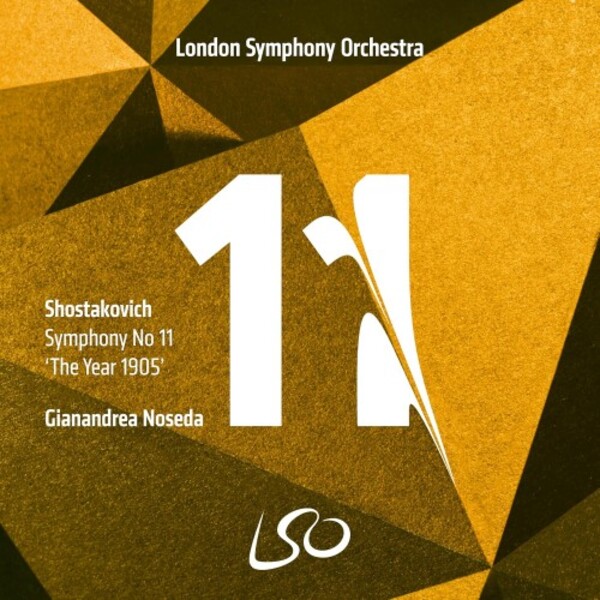SHOSTAKOVICH Symphony No 11 (Noseda)
View record and artist detailsRecord and Artist Details
Genre:
Orchestral
Label: LSO Live
Magazine Review Date: 05/2025
Media Format: Super Audio CD
Media Runtime: 63
Mastering:
DDD
Catalogue Number: LSO0888

Tracks:
| Composition | Artist Credit |
|---|---|
| Symphony No. 11, 'The Year 1905' |
Dmitri Shostakovich, Composer
Gianandrea Noseda, Conductor London Symphony Orchestra |
Author: David Gutman
The Eleventh occupies a curious place in Shostakovich’s symphonic journey. Once deemed to represent a lowering of critical sights, its cinematic mise en scène can attract fans unenthused by the composer’s more obviously ‘symphonic’ process pieces. Perhaps the programmatic Eleventh, Twelfth and Thirteenth should be regarded as a ‘civic trilogy’ with profound messaging of its own. The risk is that the music otherwise becomes a kind of concerto for orchestra. Be that as it may, Gianandrea Noseda is exploring all 15 in the context of an impeccably controlled LSO Live Shostakovich cycle.
In March 2002 a previous incarnation of this orchestra delivered the goods for Mstislav Rostropovich in a classic Eleventh still available for download (LSO Live, 9/02) or in physical format on the Alto label. Noseda, who recently renewed his commitment to Washington’s National Symphony Orchestra where the great cellist-turned-conductor was Music Director between 1977 and 1994, will be as familiar with his long-breathed interpretation as the rest of us. Now, 20 years on from Rostropovich’s LSO remake, Noseda chooses another path, lopping 10 minutes from its overall running time.
On November 24, 2022, the LSO was supplemented by young ‘exchange fellows’ from the Music Academy of the West in Santa Barbara, California. Not that anyone has trouble getting round the notes, whether navigating the first movement’s long stretches of expectant hush (less world-weary this time, with the old revolutionary songs more actively shaped and foregrounded) or delivering the climactic assault of ‘Ninth of January’. Common to both readings are the trombones’ leering glissandos en route and a stunning cliff-edge dynamic adjustment after the carnage. Andris Nelsons (DG, 9/18) secures those elements and more with a much faster tempo for the ultimate crisis. The third movement’s memorialising from the violas exemplifies the sheer class of the LSO but might be construed as almost too professional. Is it the more ingratiating Symphony Hall acoustic that makes Nelsons seem to go deeper? In London as in Boston the finale is launched with a very special unanimity and force – arguably Shostakovich’s fault if things sag in the middle as the playing is wonderful. The delayed climax comes with brass dominant and, as miked, oddly unobtrusive bells, not that they should necessarily ring on as Rostropovich preferred. Timpani are precisely pitched.
While London’s Barbican Hall will never be an easy venue, the weight of sound here does catch something of the sledgehammer immediacy of music-making in its shallow auditorium. Souvenir hunters may regret that applause is excluded; label policy remains wedded to high standards of editing, presentation and design.
Discover the world's largest classical music catalogue with Presto Music.

Gramophone Digital Club
- Digital Edition
- Digital Archive
- Reviews Database
- Full website access
From £8.75 / month
Subscribe
Gramophone Full Club
- Print Edition
- Digital Edition
- Digital Archive
- Reviews Database
- Full website access
From £11.00 / month
Subscribe
If you are a library, university or other organisation that would be interested in an institutional subscription to Gramophone please click here for further information.




